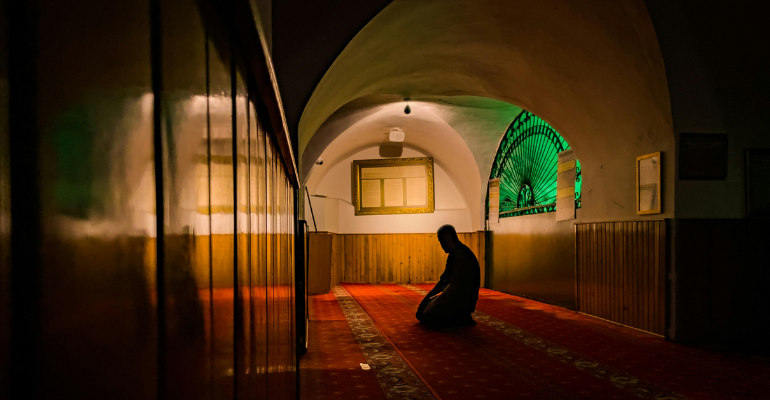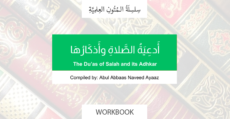Reference: Majmū’ Fatāwa wa Rasāil Ibn ‘Uthaymīn, Vol 13.
In the name of Allāh, ar-Raḥmān (the most merciful), ar-Raḥīm (the bestower of mercy).
From Muḥammad Ibn Ṣāliḥ Uthaymīn to the noble brother… [1] may Allāh, the Most High, preserve him
Assalāmu ‘alaykum wa raḥmatullāhi wa barakātuh,
Your correspondence – dated to the last month – reached us, and as for your question regarding the ruling of saying the Adhkār out aloud after obligatory Ṣalāh, and how it is said:
The response: saying Dhikr loudly after the obligatory Ṣalāh is the Sunnah, as has been proven from the Ḥadīth in Al-Bukhārī upon the authority of ‘Abdullāh Ibn Abbās, that the practice at the time of the Prophet ﷺ was to raise the voice when people finished the obligatory Ṣalāh.
Ibn Abbās, radiAllāhu ‘anhu, said:
“I used to know people had finished their Ṣalāh due to hearing it (i.e. the takbīr).
This narration is from the Aḥādīth of ‘Umdat [al-Aḥkām].
Also in the Ṣaḥīḥ, upon the authority of al-Mughīrah Ibn Shu’bah who said:
I heard the Prophet ﷺ say, after finishing Ṣalāh: Lā ilāha illa Allāh wahdahū lā sharīka lahū (There is no deity worthy of worship except Allāh, He is alone and has no partners).
[The point is] that it is not possible for a statement to be heard unless the person saying it does so loudly.
This view – of saying the Adhkār out aloud – has been chosen by Shaykh al-Islām Ibn Taymiyyah (may Allāh have mercy upon him), and a group from the Salaf and those who came after them. This is due to the Aḥādīth of Ibn Abbās and al-Mughīrah, radiAllāhu anhumā.
Saying the adhkār aloud is general for every legislated dhikr said after Ṣalāh, regardless of whether it is tahlῑl [2], tasbῑḥ [3], takbῑr [4] or taḥmῑd [5]. This is due to the generality of the Ḥadīth of Ibn Abbās. There is nothing narrated from the Prophet ﷺ that would differentiate between tahlῑl and the other adhkār. Rather the hadīth of Ibn Abbās mentions the people would know the ending of the Ṣalāh due to the takbῑr being said aloud, so this is a reply to those who say that tasbῑḥ, taḥmῑd and takbῑr should not be said loudly.
Those who believe that saying the adhkār aloud is a bid’ah (innovation) are making a mistake. How could an action that was a continuous practice at the time of the Prophet ﷺ be a bid’ah?
Shaykh Salmān Ibn Samḥān, rahimahullāh, said, “This [saying the adhkār aloud] has been established from the actions of the Prophet, as well as his tacit approval. The companions used to say adhkār aloud at the time of the Prophet ﷺ after he had taught them, and he would approve of it. This shows they only learnt this from the Prophet ﷺ by him teaching them. So the companions would do it, and he would accept the action from them knowing they were doing it and he did not forbid them.”
If a person forbids making Dhikr out aloud, using the following Āyah as an evidence,
{Remember your Lord within yourself with humility and reverence, without being loud in speech, both morning and evening. And do not be among the heedless} [07:205]
We reply to him: The same one who was ordered to make Dhikr of His Lord quietly (i.e. the Prophet), {within yourself in humility and in fear} he is the same one who used to make Dhikr loudly after the obligatory Ṣalāh. Is this person more knowledgeable about the explanation of [the speech of Allāh] than his Messenger?
Or perhaps he believes that the Messenger ﷺ knew the intent [behind the āyah] but opposed it?
Also, [another explanation is] that the āyah is regarding dhikr in the morning and evening, {in the mornings and the evenings}. This āyah is not regarding the legislated dhikr after obligatory Ṣalāh.
Additionally, Ibn Kathīr clarified the meaning of {without being loud in speech}, that it refers to saying them extremely loud (i.e. shouting).
Also, if a person forbids saying adhkār out aloud due to the saying of the Prophet ﷺ:
O people be easy with yourselves [when saying dhikr]. [6]
We say: The one who said: “Be easy with yourselves” is the same one who used to say the adhkār aloud after obligatory Ṣalāh. Therefore there is a time [for saying the Adhkār quietly] and there is a time [for saying them loudly]; and following the Sunnah completely is in implementing each evidence according to its specific situation.
Also, the context of the Ḥadīth “be easy with yourselves” proves that the Companions used to say the dhikr very loud such that it would be difficult for them and it was exaggerated. For this reason, he said to them: be gentle [upon yourselves] with dhikr and do not force it. As for saying the Adhkār loudly after Ṣalāh, there is no difficulty nor is it exaggerated.
If a person says: this will irritate and annoy others. It is said to him: If you mean by “it irritating and annoying” the person who himself is saying it loud because he is not accustomed to saying it loud, then the believer to whom the Sunnah becomes clear will no longer be annoyed or irritated.
If however, he means other people in the congregation will be annoyed and irritated, then if no person amongst them came late [and is making up missed Raka’āt], it will not affect them – as is the case. However, if there is a person besides you who is making up missed Raka’āt, do not say your adhkār too loud as to disturb him as it may distract them. If however, he is far away from you, your loud adhkār will not disturb him.
So according to what we have mentioned, it is clear that the Sunnah is to raise the voice when saying the Adhkār after obligatory Ṣalāh, and there is no contradiction between this and other authentic proofs or clear understanding.
I ask Allāh to bestow beneficial knowledge and righteous actions upon everybody; he is near and he responds.
May peace and salutations be upon our Prophet Muḥammad, and upon his family and companions.
Footnotes
[1] It appears this article was originally a written question sent to the Shaykh, and the Shaykh wrote back to him directly. However, when the fatwa was compiled in his Majmū’ the name of the questioner was omitted.
[2] Tahlῑl: saying ‘Lā ilāha illa Allāh’.
[3] Tasbῑḥ: Saying ‘Subḥānallah’.
[4] Takbῑr: saying ‘Allāhu Akbar’.
[5] Taḥmῑd: Saying ‘Alḥamdulillāh’.
[6] Narrated by Abu Mūsa Al-Ash’arῑ; Collected by Al-Bukhhārῑ.
The full narration is: “We were with the Prophet ﷺ on an expedition. Whenever we ascended a mountain or descended to a valley we would raise our voices with the Takbῑr. So he came close to us and said: “O people, be easy with yourselves. You are not invoking One who is deaf nor absent, rather you are invoking the all-Hearing and the all-Seeing.”
الجهر بالذكر بعد الصلاة
المرجع: مجموع فتاوى ورسائل الشيخ محمد صالح العثيمين – المجلد الثالث عشر
بسم الله الرحمن الرحيم
من محمد الصالح العثيمين إلى الأخ المكرم … حفظه الله تعالى.
السلام عليكم ورحمة الله وبركاته.
كتابكم المؤرخ في الشهر الماضي وصل، وسؤالكم عن: حكم الجهر بالذكر بعد الصلوات المكتوبة وصورته.
فالجواب: أن الجهر بالذكر بعد الصلوات المكتوبة سنة، دل عليها ما رواه البخاري من حديث عبد الله بن عباس رضي الله عنهما أن رفع الصوت بالذكر حين ينصرف الناس من المكتوبة كان على عهد النبي صلى الله عليه وسلم قال: “وكنت أعلم إذا انصرفوا بذلك إذا سمعته”، ورواه الإمام أحمد وأبو داود،
وهذا الحديث من أحاديث العمدة، وفي الصحيحين من حديث المغيرة بن شعبة رضي الله عنه قال: سمعت النبي صلى الله عليه وسلم يقول إذا قضى الصلاة: “لا إله إلا الله وحده لا شريك له” الحديث، ولا يسمع القول إلا إذا جهر به القائل.
وقد اختار الجهر بذلك شيخ الإسلام ابن تيمية رحمه الله وجماعة من السلف والخلف، لحديثي ابن عباس والمغيرة رضي الله عنهم.
والجهر عام في كل ذكر مشروع بعد الصلاة سواء كان تهليلاً، أو تسبيحاً، أو تكبيراً، أو تحميداً لعموم حديث ابن عباس، ولم يرد عن النبي صلى الله عليه وسلم التفريق بين التهليل وغيره، بل جاء في حديث ابن عباس أنهم يعرفون انقضاء صلاة النبي صلى الله عليه وسلم بالتكبير، وبهذا يعرف الرد على من قال لا جهر في التسبيح والتحميد والتكبير.
وأما من قال: إن الجهر بذلك بدعة فقد أخطأ، فكيف يكون الشيء المعهود في عهد النبي صلى الله عليه وسلم بدعة؟! قال الشيخ سليمان بن سحمان رحمه الله: “ثبت ذلك عن النبي صلى الله عليه وسلم من فعله وتقريره، وكان الصحابة يفعلون ذلك على عهد النبي صلى الله عليه وسلم بعد تعليمهم إياه، ويقرهم على ذلك فعلموه بتعليم الرسول صلى الله عليه وسلم إياهم، وعملوا وأقرهم على ذلك العمل بعد العلم به ولم ينكره عليهم”.
وأما احتجاج منكر الجهر بقوله تعالى: {وَاذْكُرْ رَبَّكَ فِي نَفْسِكَ تَضَرُّعاً وَخِيفَةً وَدُونَ الْجَهْرِ مِنَ الْقَوْلِ بِالْغُدُوِّ وَالْآصَالِ}
فنقول له: إن الذي أمر أن يذكر ربه في نفسه تضرعاً وخيفة هو الذي كان يجهر بالذكر خلف المكتوبة، فهل هذا المحتج أعلم بمراد الله من رسوله، أو يعتقد أن الرسول صلى الله عليه وسلم يعلم المراد ولكن خالفه، ثم إن الآية في ذكر أول النهار وآخره: {بِالْغُدُوِّ وَالْآصَالِ} وليست في الذكر المشروع خلف الصلوات، وقد حمل ابن كثير في تفسيره الجهر على الجهر البليغ.
وأما احتجاج منكر الجهر أيضاً بقوله صلى الله عليه وسلم: “أيها الناس أربعوا على أنفسكم” الحديث.
فإن الذي قال: “أيها الناس أربعوا على أنفسكم”، هو الذي كان يجهر بالذكر خلف الصلوات المكتوبة، فهذا له محل، وذاك له محل، وتمام المتابعة أن تستعمل النصوص كل منها في محله.
ثم إن السياق في قوله: “أربعوا على أنفسكم”، يدل على أنهم كانوا يرفعون رفعاً بليغاً يشق عليهم ويتكلفونه، ولهذا قال: “أربعوا على أنفسكم”، أي: ارفقوا بها ولا تجهدوها، وليس في الجهر بالذكر بعد الصلاة مشقة ولا إجهاد.
أما من قال: إن في ذلك تشويشاً.
فيقال له: إن أردت أنه يشوش على من لم يكن له عادة بذلك، فإن المؤمن إذا تبين له أن هذا هو السنة زال عنه التشويش، إن أردت أنه يشوش على المصلين، فإن المصلين إن لم يكن فيهم مسبوق يقضي ما فاته فلن يشوش عليهم رفع الصوت كما هو الواقع، لأنهم مشتركون فيه، وإن كان فيهم مسبوق يقضي فإن كان قريباً منك بحيث تشوش عليه فلا تجهر الجهر الذي يشوش عليه لئلا تلبس عليه صلاته، وإن كان بعيداً منك فلن يحصل عليه تشوش بجهرك.
وبما ذكرنا يتبين أن السنة رفع الصوت بالذكر خلف الصلوات المكتوبة، وأنه لا معارض لذلك لا بنص صحيح ولا بنظر صريح، وأسأل الله تعالى أن يرزقنا جميعاً العلم النافع والعمل الصالح، إنه قريب مجيب، وصلى الله وسلم على نبينا محمد وعلى آله وصحبه أجمعين.





